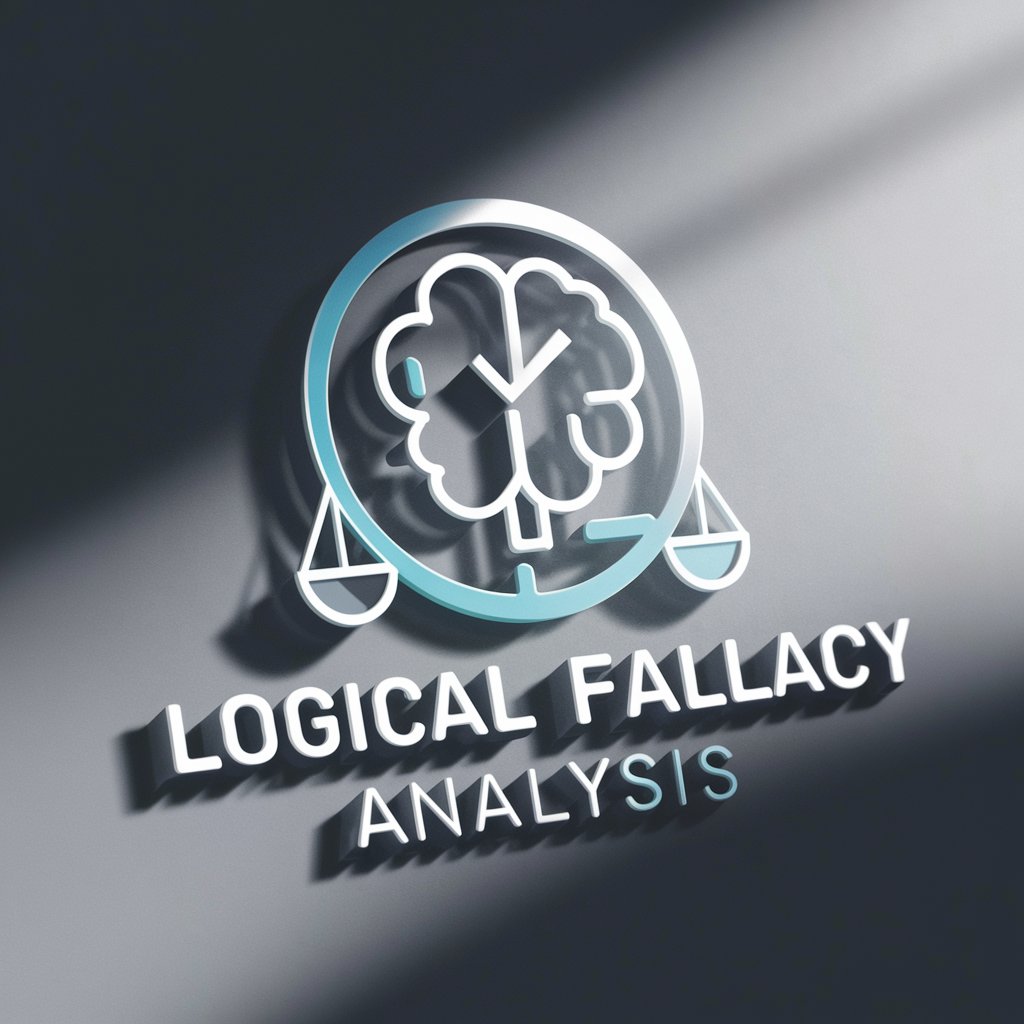Logical Fallacy Analysis - Logical Fallacy Identification

Hello! I'm here to help you analyze logical fallacies.
Sharpen Your Arguments with AI
Identify the logical fallacy in the following argument:
Analyze this statement for any logical fallacies:
Determine if there are any fallacies in this reasoning:
Evaluate this claim for potential logical errors:
Get Embed Code
Introduction to Logical Fallacy Analysis
Logical Fallacy Analysis is designed to identify and explain errors in reasoning within arguments, known as logical fallacies. These fallacies are mistakes in logic that can invalidate an argument or make it misleading. The purpose of Logical Fallacy Analysis is to enhance critical thinking and reasoning skills by detecting these errors. For example, if someone argues that a politician must be untrustworthy because they have been criticized in the media, this would be identified as an Ad Hominem fallacy, where the argument attacks the person instead of addressing the argument or evidence at hand. Powered by ChatGPT-4o。

Main Functions of Logical Fallacy Analysis
Identification of Logical Fallacies
Example
Detecting an 'Appeal to Authority' fallacy in a statement like 'This must be true because an expert said so,' without considering the evidence or the expert's credibility.
Scenario
In academic writing or debates, where accurate and logical argumentation is crucial, identifying such fallacies can strengthen the argument by focusing on evidence rather than inappropriate appeals.
Improvement Suggestions
Example
Revising a 'Slippery Slope' argument that unjustifiably connects an initial act to a series of negative events, by encouraging the inclusion of evidence or reasoning to support the causal links.
Scenario
In policy-making discussions, where the implications of a decision are debated, ensuring arguments are logically sound and based on evidence can lead to more effective and rational policy decisions.
Educational Tool
Example
Using analysis feedback to teach students about logical fallacies in their argumentative essays, helping them understand and avoid common reasoning errors.
Scenario
In educational settings, especially in courses focused on critical thinking, writing, or philosophy, where students can improve their reasoning and argumentative skills through feedback and examples.
Ideal Users of Logical Fallacy Analysis Services
Students and Educators
Students learning about critical thinking, argumentation, and logic can benefit from identifying and understanding logical fallacies. Educators can use this analysis to provide constructive feedback and enhance teaching materials on logical reasoning.
Debaters and Public Speakers
Individuals engaged in debate, public speaking, or any form of argumentative discourse can refine their arguments, avoid logical pitfalls, and strengthen their persuasive abilities through logical fallacy analysis.
Writers and Journalists
Writers, including journalists, can use logical fallacy analysis to scrutinize their work for errors in reasoning, ensuring their arguments are coherent and persuasive while maintaining a high standard of credibility in their writing.
Policy Makers and Analysts
For those involved in policy-making or analysis, logical fallacy analysis is invaluable for evaluating the strength and validity of arguments concerning policy decisions, ensuring they are based on sound reasoning and evidence.

How to Use Logical Fallacy Analysis
1
Start with a visit to the designated platform offering Logical Fallacy Analysis for an accessible trial, no sign-up or premium subscription required.
2
Identify the statement or argument you want to analyze for logical fallacies.
3
Input the statement into the Logical Fallacy Analysis tool.
4
Review the analysis provided, noting any identified fallacies and suggestions for correction.
5
Use the feedback to refine your argument or understanding of logical fallacies for clearer, more logical communication.
Try other advanced and practical GPTs
CARD GAME Chef モンスターズポケット
Master Pokémon Cards with AI

Koto Sensei - JLPT N3 to N2 Japanese teacher
AI-powered path from JLPT N3 to N2

AP World History Modern
Empowering History Learning with AI

Classroom Group Organizer
Streamline classroom collaboration with AI

AP Chemistry
Master Chemistry with AI

Word Weaver
Elevate Your Writing with AI

WoW WeakAura Generator
Elevate Your Gameplay with AI-Powered WeakAura Customization

AI Graphic Designer
Designing with AI, for you.

Mastering the Basics of Graphic Design
Empowering Design Creativity with AI

Design Buddy+
Empowering Design Creativity with AI

Creative Spark
Empowering Design with AI Creativity

super designer
Design smarter, not harder, with AI.

Frequently Asked Questions about Logical Fallacy Analysis
What is Logical Fallacy Analysis?
Logical Fallacy Analysis is a process or tool designed to identify and explain logical fallacies within arguments or statements, helping users to refine their reasoning and arguments.
Can Logical Fallacy Analysis help in academic writing?
Yes, it can significantly improve the quality of academic writing by identifying weak arguments or flawed reasoning, allowing for the strengthening of one's thesis or argumentative essays.
Is this tool suitable for everyday arguments?
Absolutely, Logical Fallacy Analysis can be used to evaluate everyday arguments, enhancing critical thinking and the quality of discussions.
How accurate is Logical Fallacy Analysis?
While highly effective in identifying a wide range of logical fallacies, the accuracy can depend on the complexity of the argument and the clarity of the input.
Can it analyze any type of content?
It's best suited for textual arguments or statements. The effectiveness may vary across different formats, such as spoken debates or multimedia presentations, due to the need for clear, textual inputs.
